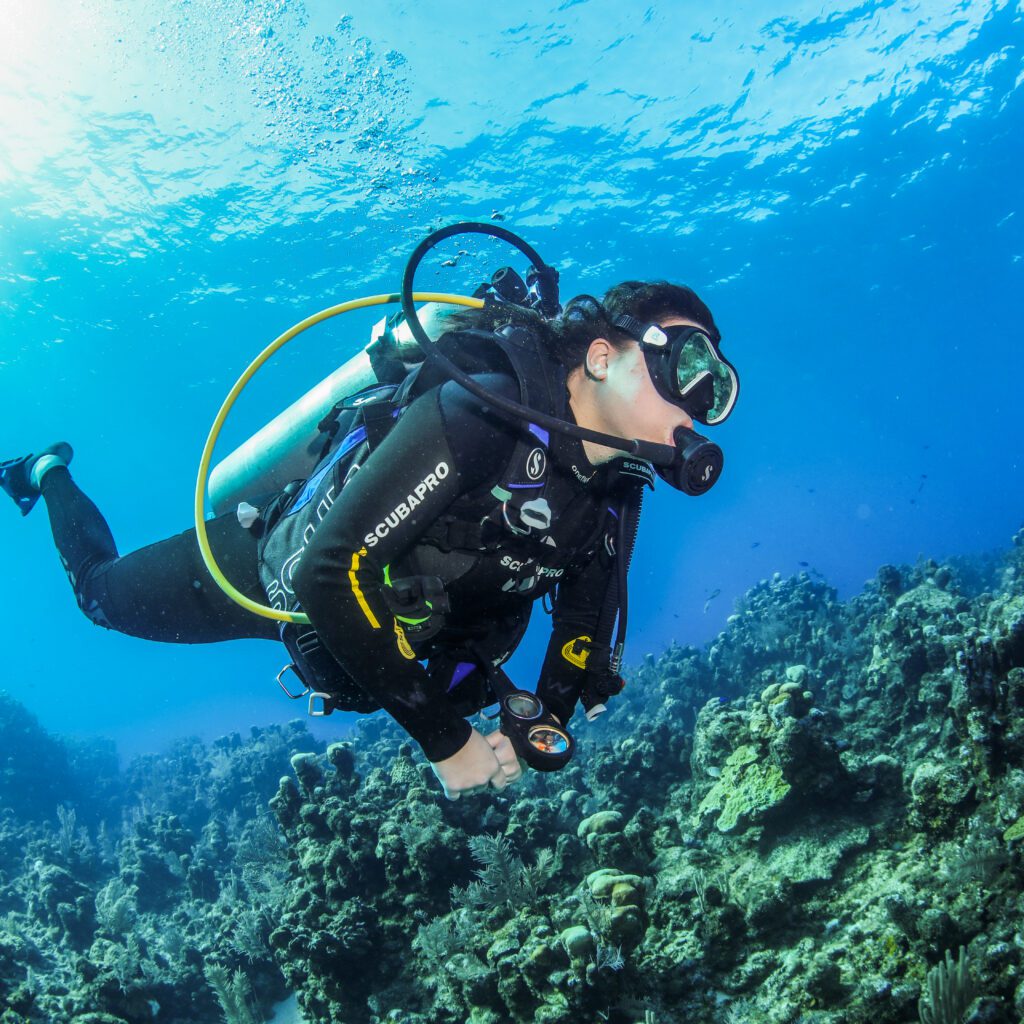March, 2024
Do You Need a Wetsuit to Dive in Roatan?
Roatan is a Caribbean paradise known for its scenic and beautiful reefs. Its warm tropical waters attract a diversity of marine life and many divers each year. But are Roatan’s waters so warm that you don’t need a wetsuit to dive in Roatan?
Generally, yes, most people need a wetsuit to dive in Roatan. But depending upon the year and personal preference, the type of exposure suit you need can vary from full 3mm to even just a rashguard.
Let’s explore the 5 factors that can help you decide if you need a wetsuit to dive in Roatan and what type of wetsuit is best for you:
1. Water temperature
While Roatan enjoys cozy tropical waters throughout the year, the temperature can vary slightly depending on the season. The average water temperature ranges from 80°F (25°C) to 84°F (29°C). The water tends to be warmer during the summer months from May to September. The temperature slightly drops during the winter months from October to April. If you’re on the “get-cold easy” side or plan to do multiple dives a day, a wetsuit can provide added comfort and insulation.
Most divers choose to wear a 2.5mm shorty or even just a rash guard and leggings during the summer months. And then a full 3mm wetsuit during the winter months. People who get colder might also opt to add an extra layer of protection with a hooded vest under their wetsuit to dive in Roatan. Then there are those who seem to run hot year-round and opt for just a shorty or rash guard any time of year. This gives them ultimate freedom and mobility – but isn’t for the faint of heart!
If you want to find out more about the weather in Roatan throughout the year, read our post on: When is the best time to dive in Roatan?
2. Dive duration
The longer you’re in the water, the colder you might get. For short dives in shallow water, you’ll maybe be comfortable enough without a wetsuit. But for longer dives a wetsuit can help regulate your body temperature and protect you from potential heat loss. It’s really annoying to not enjoy your dive because you’re too cold. You might also get cold, when you’re doing multiple dives a day. At Sun Divers, all fun dives are at least 60 minutes. Consider how long your dives and surface intervals will be for your decision on if you need a wetsuit to dive in Roatan or not.
3. Dive depth
Another factor to consider when deciding whether you want to wear a wetsuit to dive in Roatan is your dive depth. As you descend into deeper waters, the temperature drops. In Roatan, the water temperature starts to cool when you descend beyond approximately 30 to 40 ft (9 to 12 m). You might feel the temperature drop a bit, especially if you spend an extended amount of time down there. If you’re into deep dives, Roatan has a few interesting dives that you might want to check out such as Hole in the Wall and our wrecks, The Aguila and Odyssey. It is important to note that the exact temperature variation can vary depending on factors such as the season and current as well.
In order to dive below 60 ft (18m) you need to be Advanced Open Water certified or do it as an Adventure Dive. You can find out about the benefits to get Advanced Open Water certified in our blog post.
4. Personal comfort
Every diver has their own preferences and comfort levels when it comes to ideal water temperatures. Some divers may feel comfortable diving without a wetsuit in Roatan’s warm waters. Others may prefer the added comfort, protection and warmth that a wetsuit provides. Ultimately, it is a personal choice based on your individual comfort and needs. Regardless of your decision, we always recommend wearing a rash guard or mineral-based sunscreen to protect your skin from the sun’s rays. If you do wear sunscreen please avoid petro-chemical sunscreens.
You can find out more about reef safe sunscreen.
5. Protection
Besides temperature regulation, wetsuits also offer additional benefits such as protection against the sun’s harmful rays or jellyfish stings. Diving in tropical environments closer to the equator means being exposed to intense sunlight, and wearing a wetsuit can provide a layer of UV protection for your skin. Luckily, we don’t see many jellyfish in Roatán. But occasionally, they hang out at the surface during night dives. If there is any, a wetsuit will protect you from being stung.
Gloves are not allowed
Did you know that in the Roatan Marine Park, the use of gloves during diving is not permitted? There are good reasons for this regulation. The main purpose of the Roatan Marine Park is to protect and preserve the delicate marine ecosystem of this incredible reef. This includes the corals and other marine life. Gloves can unintentionally cause damage. The texture of gloves can damage corals and other fragile organisms when touched. Gloves may also give divers a false sense of security. This can lead to careless contact with delicate structures. Eco friendly and sustainable diving practices are a top priority at Sun Divers. By respecting the “no gloves” policy, we can contribute to the conservation efforts of the marine park and ensure that no one is “touching, taking or teasing” the wildlife.
We’ll help you choose
At Sun Divers, we understand that divers have different preferences when it comes to thermal protection and sun exposure. Our experienced staff will guide you and give you recommendations based on current water conditions, your individual preferences, and the dive site characteristics. We offer a variety of different style and thickness wetsuits to rent from including 3mm full wetsuits, shorties and a variety of rash guards.
If you prefer to purchase your own wetsuit we are a certified Scubapro dealer and we offer deals, as well as direct shipping to Sun Divers customers.
Whether you choose to dive with a wetsuit, a rash guard, or without any additional protection at all, discover the beauty of our underwater world and embark on unforgettable diving adventures in Roatán with Sun Divers. We prioritize safety, small group diving and epic adventures.
So, do you need a wetsuit to dive in Roatán? The choice is yours, and we’re here to support you every step of the way as you explore the wonders beneath the surface of the Caribbean Sea. Contact us for more information.










